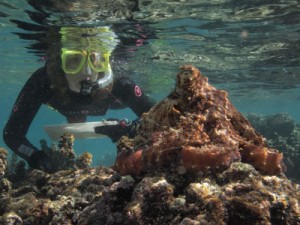
In this astonishing book from the author of the bestselling memoir, The Good Good Pig, Sy Montgomery explores the emotional and physical world of the octopus—a surprisingly complex, intelligent, and spirited creature—and the remarkable connections it makes with humans.
Sy Montgomery’s popular 2011 ORION magazine piece, “Deep Intellect,” about her friendship with a sensitive, sweet-natured octopus named Athena and grief at her death, went viral, indicating the widespread fascination with these mysterious, almost alien-like creatures. Since then she has practiced true immersion journalism, from New England aquarium tanks to Mexico and French Polynesia, pursuing these solitary shape-shifters. With a central brain the size of that of an African grey parrot and neural matter in each of its eight arms, octopuses have varied personalities and intelligence they show in myriad ways: endless trickery to get food and escape enclosures; jetting water playfully to bounce objects like balls; and evading their caretakers by using a scoop net as a trampoline and running around the floor on eight arms. But with a beak like a parrot, venom like a snake, and a tongue covered with teeth, how can such a being know anything? And what sort of thoughts could it think?

The intelligence of dogs, birds, and chimpanzees was only recently accepted by scientists, who now are establishing the intelligence of the octopus, watching them solve problems and deciphering the meaning of their color-changing camouflage techniques. Montgomery chronicles this growing scientific appreciation of the octopus, but also tells a love story. By turns funny, entertaining, touching, and profound, The Soul of an Octopus ultimately reveals what octopuses can teach us about the nature and consciousness of the mind.
Sy Montgomery is a naturalist, documentary scriptwriter, and author of twenty acclaimed books of nonfiction for adults and children, including the memoir The Good Good Pig, which was a national bestseller. The recipient of numerous honors, including lifetime achievement awards from the Humane Society and the New England Booksellers Association, she lives in New Hampshire with her husband, border collie, and flock of chickens.
1. Sy Montgomery writes about her scientific and emotional attraction to octopuses. Did anything surprise you in her poetic, sensuous language about the octopuses? Does she make clear what science cannot explain about octopuses?
2. How does Montgomery describe the different personalities that the octopuses have? Do you agree with her assessments of their attributes? Can you relate to the emotions that she interprets them to have?
3. Otherness is a central issue in the book – the otherness of the octopus and its dramatically different nature from other mollusks as well as the differences between cephalopods and people. How does Montgomery use the otherness of the octopus to show the ways the human characters in the story can feel that they don’t fit in or belong? How do the human characters with their varied backgrounds find ways of coming together and belonging?
4. The similarities between octopuses and humans are another theme. What are the similarities that Montgomery sees? Would you share her point of view or do you see the differences more than the similarities?
4. What does Montgomery reveal about what constitutes consciousness, in humans and animals? Does she show that octopuses have consciousness?
5. Does Montgomery address and answer the question of whether an octopus can have a soul? If so, how does she show the animal has a soul? If not, does she explain that the animal does not have a soul?
6. What is anthropomorphism? Given what science knows now about the consciousness of animals, is anthropomorphism a problem? If so, why?
7. What are the issues involved in collecting wild octopuses from the oceans and studying them in an aquarium?
8. Many cultures consume octopuses as food. Do you see any issues regardingeating octopuses?
9. For a book that imparts a wealth of scientific information about octopuses, Montgomery uses humor and also a deep sense of feeling and respect for the octopus and all of nature. How does Montgomery convey the major conservation issues, such as global warming and the health of the oceans, in the stories she tells in this book about people and animals?
10. Has your view of human consciousness changed after reading this account? Has your view of animal consciousness changed? What information specifically influenced you?
11. Has your perspective on nature and on octopuses been influenced by this book? What views has the book reinforced and what views has it changed your mind about?
Enhance your understanding of THE SOUL OF AN OCTOPUS:
1. Watch videos of octopuses. [There are several listed in the book’s Bibliography.]
2. Describe times when you’ve undergone the life passages that the octopus goes through in only two years. What life challenges did you have to face that the octopuses in the aquariums also face? What life challenges have you had to face that the human community that grew up around the octopuses also had to face: your own illness or that of a loved one, difference and desire to fit in, loss and loneliness, the birth and growth of friendships, ways to connect with others through play? What did you learn about your experience and how did it affect your relationships with others?
3. If you had to write a short essay about one of the most difficult parts of your life, what part would you choose to write about? What would be the obstacles to writing about this?